Ramadan away from home
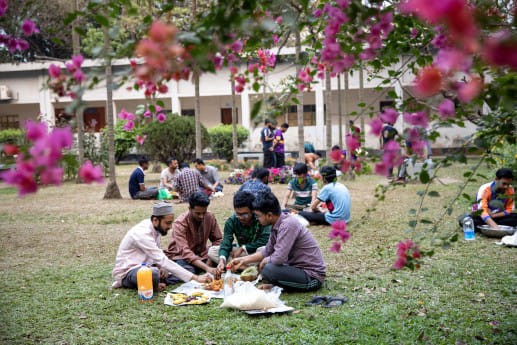
As a freshman, the realisation that I was going to have to spend the very first day of Ramadan at my university dormitory was nothing short of crushing. Between phone calls from home telling me that my absence was deeply felt and not having the chance to busy myself with iftar preparations – the entire ordeal weighed heavy. In retrospect, the iftar items that my hostel provided were quite delicious, but my homesickness hindered my ability to enjoy them. Despite an apprehensive beginning, I'd spent another two Ramadans at my university. I am currently spending another.
Homesickness has always been associated with Ramadans spent at dorms. Even though I am able to return home on the weekends, this is a privilege many students, including my peers who aren't residents of Dhaka, cannot afford until classes have wrapped up. The difficulties of spending Ramadan aren't simply limited to homesickness. There are a bunch of challenges students must navigate as they balance their studies with worship and fasting. Rigid schedules for classes and exams don't exactly help the situation. In the month of abstinence and devotion, it's quite important for dormitories to ensure an environment conducive to religious practices. According to Rabiul Hasan, a student at Dhaka University (DU) and a resident of Sir AF Rahman Hall, the hostel environment falls short in this regard.
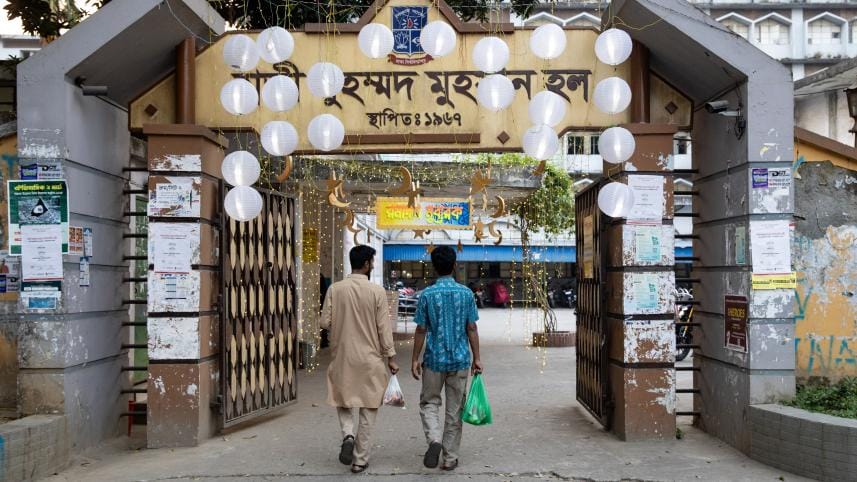
He shares, "I've generally had a good experience spending Ramadan in dorms. However, there were some challenges, such as having sehri very early due to fixed schedules. It felt as though I couldn't fully absorb the spiritual aspects due to the dorm environment."
"The communal atmosphere and shared experience can be motivating, but rigid schedules and limited facilities can often be disruptive. At home, I have more flexibility, which can help in terms of both studying and worship. It's also difficult to find quiet spaces for prayer and reflection. I feel that my experience can be improved if the dorm residents were more mindful about the noise level and considerate regarding schedules," he adds.
While the menu varies from household to household, some items such as dates, jilapi, beguni, piyaju, etc., are commonplace. Moreover, dorms around the country generally serve these items. While the health repercussions of having fried items during iftar can be debated, the main concern for students is the quality of the food itself. Not to mention, not all dorms are able to serve all their residents, which forces some students to resort to local hotels and restaurants. There's also the matter of other meals like sehri, as well as breakfast and lunch – for those who don't or are unable to fast – that often goes unaddressed.
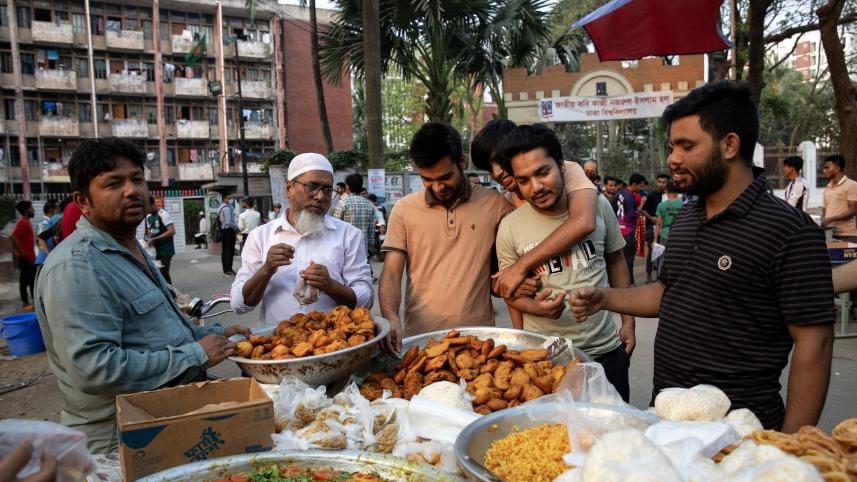
Humayra Adiba, a student at Chittagong Medical College, shares that her dormitory has been able to facilitate quality food for students. "My experience spending Ramadan at the dorms was far better than I expected, although it was a little sad without my family. All my roommates and I had iftar together, and good food was available close to our dorms. My dorm provides regular iftar items like beguni, piyaju, chola, and alur chop, which are quite good. We are served rice and curries for sehri, but the quality is not satisfactory. The dormitory doesn't generally make enough for everyone, as some students buy food from outside or cook in their own dorm rooms. The dorm canteen doesn't provide breakfast and lunch for those not fasting either," she remarks.
She adds that despite having access to tools, it's not always feasible for students to cook for themselves. "We have classes and a lot of academic pressure to deal with so we're always rushing to have sehri and iftar. We also don't have enough time to cook proper food. I believe the dormitory should seek to ensure the quality of food is high as well as make sure there's enough for all its residents," she explains.
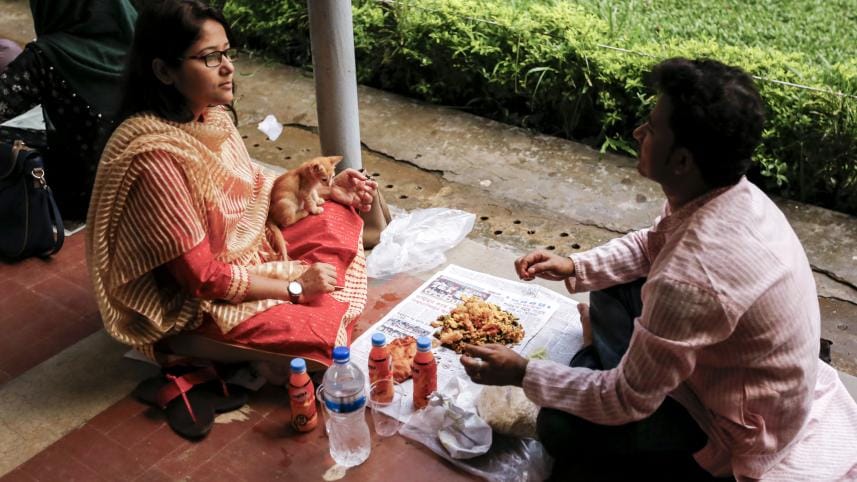
Not all dormitories are able to live up to this standard, however. Ahnaf Tahmid, a student of Rajshahi Medical College, shares that he's had some concerns about the food quality, "The quality of food in my dorm drops from time to time and we can't ever be too sure about the hygiene standards of restaurants and hostels either. We also don't always have the appetite to eat dorm food. On the flip side, we're often too tired to cook for ourselves. While we can't expect dorm food to go toe-to-toe with homemade meals, healthy food is the primary concern. I wouldn't want to fall sick during such a crucial time because of stale or old food. As long as that is ensured, most of us would be quite happy."
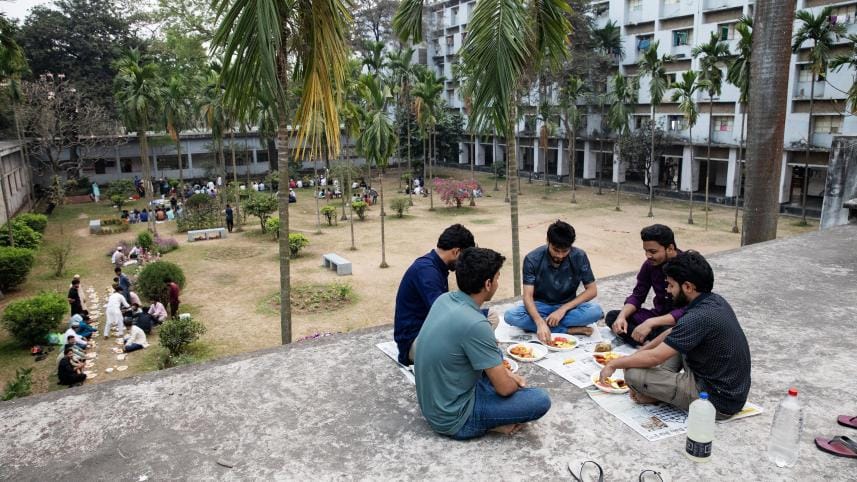
Overwhelming academic stress is another common issue that students must account for. Even though classes are marginally shortened during this month, regular academic activities cannot be condensed for multiple reasons.
Ahnaf Tahmid talks about the stress he's had to withstand as a fifth-year medical student: "Spending the majority of Ramadan in dorms is a norm as the classes keep going for at least 25 days. The healthcare field is demanding, especially in a divisional, state-owned hospital. We have classes from morning till noon and have to attend wards and clinical classes. Even though it's quite tough and borderline uncomfortable at times, I'd advocate for staying at the dorms for productivity."
Most dorms don't enforce a schedule, but academic course load basically forces students to adhere to a routine.
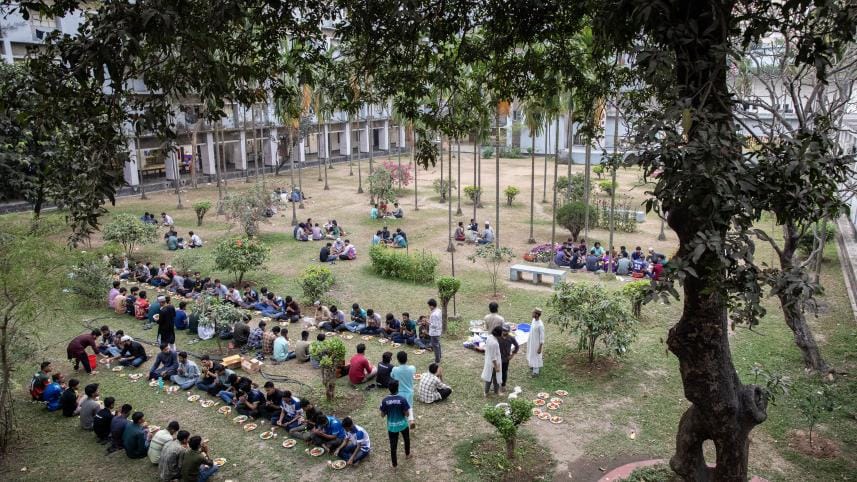
Safwan Sami, a student at the Islamic University of Technology (IUT), shares the various reasons why he's gotten accustomed to following a certain schedule during Ramadan. "In IUT, our schedules are mostly packed with exams as well as classes. Not to mention, if you don't show up on time, you might not get food during sehri. Cooking facilities are also very limited, and cannot accommodate all the residential students. But dorm life in IUT is comfortable, and spending time with friends is fun. I've found that following a strict schedule due to classes helps me be more productive. The surroundings also help me feel closer to my faith."
Ramadan is a religious and spiritual experience. Spending it together can bring people closer. The common consensus among residential students is that once they get over homesickness, the experience is usually quite pleasant. In fact, the difficulties only make their resolutions stronger. Most importantly, even if a student is struggling, the light at the end of the tunnel –an Eid with loved ones – awaits.
Zabin Tazrin Nashita is an engineering student at the Islamic University of Technology, a chronically online night owl, and a sufferer of many migraines. Find her at: zabintn@gmail.com
 For all latest news, follow The Daily Star's Google News channel.
For all latest news, follow The Daily Star's Google News channel.
Comments